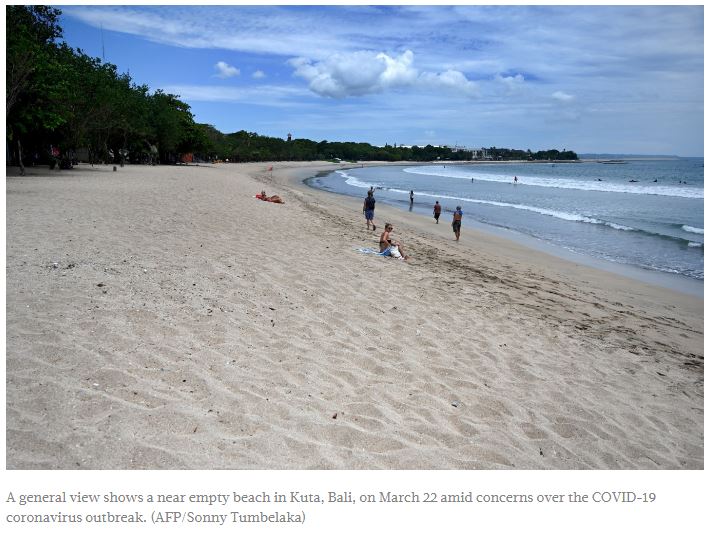Indonesia – Foreign tourist arrivals, hotel occupancy rate yet to recover in October: BPS
Tourism has yet to recover from the pandemic-induced slump, with foreign tourist arrivals and hotel occupancy rate remaining below normal levels, Statistics Indonesia (BPS) data have shown.
Foreign tourist arrivals picked up slightly to 158,200 in October, an increase of 4.57 percent month-to-month (mtm) from September, according to BPS. However, it was still down 88.25 percent year-on-year (yoy) from the same month last year.
“With regard to COVID-19, there are countries that have relaxed [mobility restrictions] and countries that continue to impose tight [restrictions], which has made foreign tourists reconsider travel due to health issues,” Setianto, the deputy of services and distribution statistics at BPS, said in a virtual presser Tuesday.
Foreign tourists came mostly from neighboring Timor Leste, Malaysia and China, which on average have fared better than Indonesia in handling the COVID-19 pandemic.
The COVID-19 health crisis has continued to put pressure on the travel industry, as people cancel travel plans due to health concerns and border restrictions.
The accommodation and food services sector contracted 11.86 percent yoy in the third quarter, making it the second-worst performing sector, according to data from BPS.
The Indonesian Hotel and Restaurant Association (PHRI) has estimated that the COVID-19 pandemic has cost the country’s tourist industry Rp 100 trillion (US$7 billion). Some 78.5 percent of hotel workers have been laid off or furloughed.
Meanwhile, the country recently passed the grim milestone of half a million COVID-19 cases on Nov. 23. Cumulative confirmed cases stood at 543,975 as of Tuesday.
Prior to the release of the latest foreign arrivals data, the government said it expected between 2.8 million and 4 million foreign tourists this year. Before the pandemic, the government sought to welcome 18 million foreign tourists, after seeing 16.1 million arrivals last year.
Accumulated foreign tourist arrivals from January to October this year clocked in 3.72 million, a 72.35 percent yoy decline from the same period last year.
The PHRI expected foreign arrivals to rise to between 13 million and 14 million next year, suggesting optimism, although the figure was still below pre-pandemic levels.
The government is in early talks to explore the possibility of arranging a travel corridor with Japan, according to Prabu Revolusi, the spokesperson of the Tourism and Creative Economy Ministry.
“But this is still in the discussion stage. There is interest from this country,” Prabu told The Jakarta Post in a phone interview on Tuesday.
Earlier this year, Indonesia established travel corridors with China, Singapore and South Korea for business and official trips.
Since foreign tourists continued to face pandemic-related fear in regard to long haul travel, the government shifted its focus to local tourists by encouraging them to “travel responsibly,” added Prabu. Local tourists have been urged to take a rapid or swab test before making their trips.
With fewer tourists staying in hotels, the hotel occupancy rate was still down by 19.3 percentage points to 37.48 percent in October from a year earlier, according to data from BPS. Although the rate shows an upward trend since May, the rebound has plateaued.
The latest uptick in hotel occupancy rate was driven mainly by a long weekend from Oct. 28 to 30 for collective leave days and Prophet Muhammad’s Birthday, according to Maulana Yusran, the vice chairman of the PHRI.
Maulana said Tuesday that while the hotel occupancy rate in most provinces was largely driven by local tourists at the moment, foreign tourists used to account for roughly 70 percent of hotel guests in Bali before the pandemic.
As a result, Bali recorded the lowest hotel occupancy rate across the country at 9.53 percent in October, according to BPS data.
To prop up the hotel occupancy rate, Maulana said the government would need to focus on requiring people to comply with health protocols rather than shorten the year-end holidays.
The government has stated that it plans to cut three days from year-end holidays amid the rise of COVID-19 cases.
“Will the upcoming holidays raise occupancy? It will increase, although at a small rate,” Maulana told the Post in a phone interview on Tuesday.
“We can close December with at least a 35 percent [of hotel occupancy rate]. If it is 35 percent, then it is good enough.”
Source: https://www.thejakartapost.com/news/2020/12/02/foreign-tourist-arrivals-hotel-occupancy-rate-yet-to-recover-in-october-bps.html


 English
English




